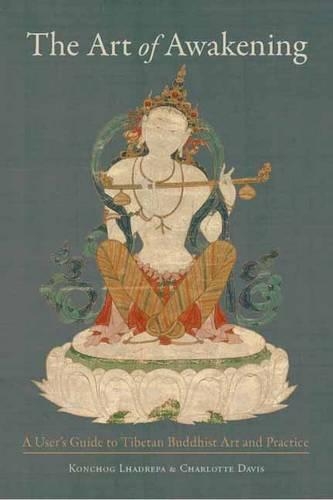
The Art of Awakening: A User's Guide to Tibetan Buddhist Art and Practice
(Paperback)
Publishing Details
The Art of Awakening: A User's Guide to Tibetan Buddhist Art and Practice
By (Author) Konchog Lhadrepa
By (author) Charlotte Davis
Shambhala Publications Inc
Shambhala Publications Inc
3rd April 2017
30th March 2017
United States
Classifications
General
Non Fiction
294.3923
Physical Properties
Paperback
496
Width 152mm, Height 229mm, Spine 33mm
726g
Description
A presentation on the Tibetan Buddhist path to enlightenment, through the lens of an artist's eye and experience. This is a guide to the complete Tibetan Buddhist path from preliminary practices through enlightenment. Uniquely, this is presented from the perspective of traditional Buddhist artists and looks at how the images in paintings, sculptures, mandalas (maps for visualization), and stupas are intrinsic to the path. This book will be invaluable to any practitioner, not just artists.
Reviews
The Art of Awakening is the one book that every student of Tibetan art, aspiring tangka painter, and Vajrayana practitioner really should have. Vast in its scope and authenticity, this definitive work by master artist Konchog Lhadrepa and his student Charlotte Davis is a phenomenal repository of knowledge on all aspects of Tibetan art and its practice. This is the book I always hoped to write but never did, and instead can learn so much from it. For this is a masterwork of the purest Dharma, which I pray will be translated into many different languages.Robert Beer, author and illustrator of The Encyclopedia of Tibetan Symbols and Motifs
The Art of Awakening is a comprehensive guide for those wishing to learn about the rich tradition of Tibetan tangka painting. In particular, this book is an essential resource for those wishing to know the inside meanings involved in the creation of a tangka painting, and the key elements of dharma practice that are essential for the aspiring tangka painter. In this day and age when the growing commercialization of perfunctory tangka paintings is ever increasing, Konchog Lhadrepa and Charlotte Davis contribution to the preservation of an authentic tradition of sacred art is admirable.
Pema Namdol Thaye, master artist and author of Tibetan Thanka Painting: Portrayal of Mysticism
Sacred art is an element of the spiritual path. For the artist, every day of his or her work should help him or her to progress a few steps further on such a path. For the other practitioners who see their art and benefit from it, sacred art is a support for meditation, a blessing and a visual representation that liberates by seeing just as sacred music liberates through hearing, the blessing of a spiritual master liberates through touch, imbibing sacred substances liberates by taste, and meditation liberates by thought. Liberate here means to liberate from the bondage of the five mental poisons, which destroy inner peacehatred, covetousness, ignorance, pride, and jealousy.
Matthieu Ricard, author of Happiness
Preserving the sacred arts is part of the preservation of the dharma.Shechen Rabjam Rinpoche, author of The Great Medicine That Conquers Clinging to the Notion of Reality
Author Bio
KONCHOG LHADREPA has been the Principal of the Tsering Art School since its foundation in 1996. He is an authentic holder of the Karma Gadri lineage of painting, which originated in Eastern Tibet and is famous for the beauty of its spacious landscapes. He became a disciple of Dilgo Khyentse Rinpoche at the age of 10 and, from the age of 16 to 22, served as his personal attendant. Over the years, Konchog painted many works for Rinpoche and his associated centers throughout the Indian subcontinent and Europe. His remarkable abilities, training, and knowledge of the sacred arts alone make him an exceptional artist. CHARLOTTE DAVIS completed a Bachelor of Fine Arts from the Australian National University, before traveling to Nepal in 1998 to study traditional Tibetan art at the Tsering Art School under Konchog's guidance. She was among the first group of graduates to complete their studies at Tsering Art School in 2003. She worked in the school administration alongside Konchog from 1998 to 2004 and today continues to work for the art school and monastery, while maintaining her practice as a thangka painter.
